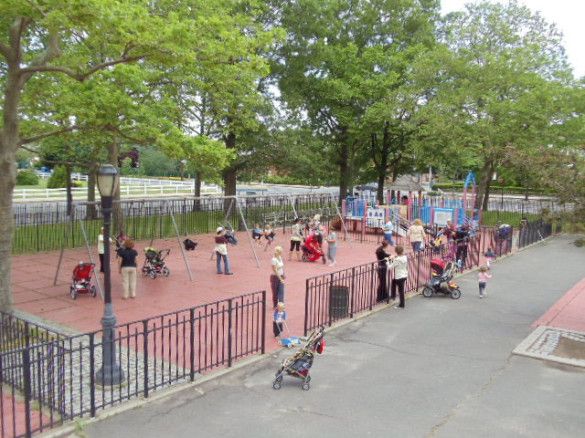Your Kid’s Park May Be Sprayed With Cancer-Causing Pesticide, Study Says

In their battle against weeds and vermin, the New York City Parks Department is using a common pesticide that a new study suggests is associated with non-Hodgkin lymphoma and breast cancer.
The new concerns arise out of a study published in April by the International Journal of Environmental Research and Public Health that found that the commercially available pesticide Roundup’s active ingredient, glyphosate, is associated with lymphoma. A report this morning in DNAinfo found that the city has sprayed Roundup in public greenspaces more than 1,300 times last year alone.
The outlet reports:
The Parks Department sprays the pesticide, called Roundup, to kill weeds that harbor rats on “little-used” areas near playgrounds, officials said. The city posts warning signs for 24 hours before and after spraying.
“In order to keep rats out of the playgrounds and meadow areas, we must use Roundup,” Parks Department spokesman Phil Abramson said. “It is not used inside playgrounds but is often used on little-used slopes outside playgrounds precisely because overgrown weeds near playgrounds harbor rats.”
The city defended its use of Roundup, which was sprayed in public parks 1,365 times in 2013. That was a 22 percent increase from the previous year as officials phased out other weed-killing chemicals that were deemed more toxic, according to a Health Department report.
The agency would not tell the outlet which parks had been sprayed, or how often.
The outlet also noted a study published last year suggesting that glyphosate effects hormones linked to breast cancer.
While extreme critics say the city should stop using pesticides in parks altogether, some say it’s sufficient to leave signs up for 72 hours after spraying, not 24. However, the city cites statistics from the manufacturer, Monsanto, that claim the product becomes harmless after 24 hours. The agency also insists that pesticides are not sprayed in commonly used areas, but only along overgrown, out-of-the-way sections.
As for Monsanto, they’re dismissing the study’s conclusion.
“Comprehensive toxicological studies repeated over the last 40 years have time and again demonstrated that glyphosate…does not cause cancer, mutagenic effects, nervous system effects, immune system effects, endocrine disruption, birth defects or reproductive problems,” company spokeswoman Charla Lord told DNAinfo.
Although it appears the city will continue to use pesticides in playgrounds, the state has banned pesticides from use in other child-friendly areas.
In 2010, Governor Paterson signed the Child Safe Playing Field Act, which prohibits schools and day care centers from applying pesticides to any playground, turf or athletic playing field out of concern for children’s health.
According to the state’s Department of Environmental Conservation, HealthGuidance:
Potential harm from pesticides is especially important to consider in schools and day care centers because children are at greater risk from chemical exposure. Children are not little adults – from infants to teens, they are growing and developing. Their bodies have not yet reached developmental maturity. This means that they are more vulnerable to the toxic effects of many pesticides and other chemicals. Behaviors of young children, such as putting things in their mouths and crawling on the floor, put them at additional risk from pesticide exposure.




